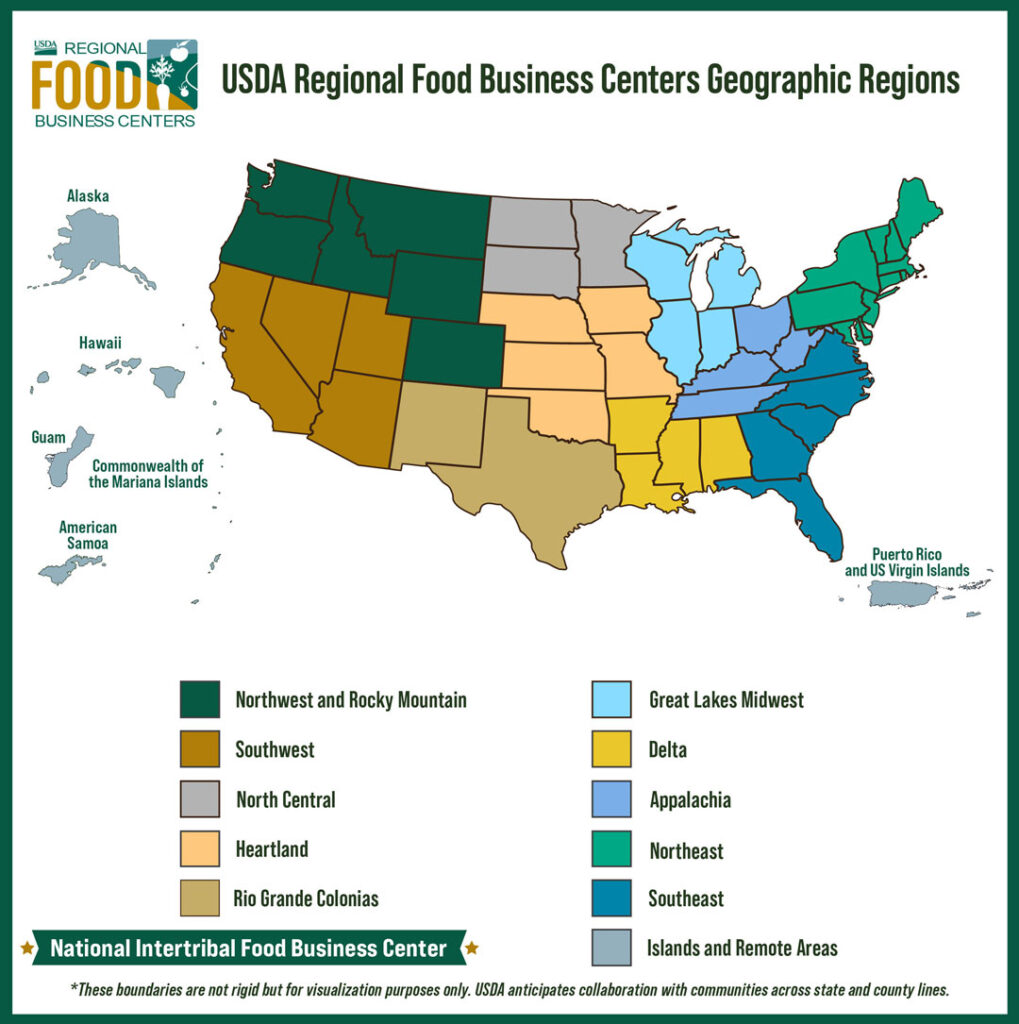WASHINGTON, May 3, 2023 – Today the U.S. Department of Agriculture (USDA) announced the creation of 12 new USDA Regional Food Business Centers that will provide national coverage coordination, technical assistance, and capacity building to help farmers, ranchers, and other food businesses access new markets and navigate federal, state, and local resources, thereby closing the gaps to success. In addition, USDA also announced a $420 million Resilient Food Systems Infrastructure Program (RFSI) to fund innovative projects designed to invest in processing and distribution capacity to build resilience across the middle of the supply chain and strengthen local and regional food systems. USDA’s Agricultural Marketing Service (AMS) will partner with state and territories’ departments of agriculture for this program.
“The Biden-Harris Administration is committed to transforming our food system to one that offers new market opportunities to small and mid-sized farming operations through a strengthened local and regional food system,” said Agriculture Secretary Tom Vilsack. “The Regional Food Business Centers, along with investments through the Resilient Food Systems Infrastructure Program will create new and expanded local market opportunities which will improve farm income, create good paying jobs and build greater resilience in our overall food system.”
“USDA recognizes that local and regional food systems are essential to the overall food supply chain and the new Regional Food Business Centers are the cornerstone of our efforts to support them,” said Under Secretary for Marketing and Regulatory Programs Jenny Lester Moffitt. “The resources and diverse knowledge offered through the Centers will make the opportunities available through dozens of USDA programs more accessible to small and mid-sized producers and food and farm businesses. The Centers technical assistance coupled with the additional funding for processing capacity and infrastructure improvements through the Resilient Food Systems Infrastructure program is bringing us many steps closer to reaching the goals of the Food System Transformation framework.”
USDA Regional Food Business Centers
In September 2022, USDA announced $400 million to fund this initiative and 12 organizations were selected to lead efforts in their region and together serve all areas of the country. The Regional Food Business Centers will support producers by providing localized assistance to access a variety of markets, including linking producers to wholesalers and distributors. By strengthening connections between rural and urban areas, the Regional Food Business Centers will drive economic opportunities across the region, creating a more diversified and resilient food system. Collectively, the organizations selected to lead each Center reflect an impressive cross-section of the varied institutions, organizations, and associations that must cooperate to achieve genuinely strong and distributed food systems. These organizations are engaging with grassroots food and farm organizations and employing a range of creative strategies to build food system resiliency. Regional Food Centers will target their work to historically underinvested communities in their region.

Lead Organization Selected for Each Center:
Appalachia USDA Regional Food Business Center, Rural Action Inc.
Delta USDA Regional Food Business Center, Mississippi Delta Council for Farmworker Opportunities
Great Lakes Midwest USDA Regional Food Business Center, Michigan State University
Heartland USDA Regional Food Business Center, University of Nebraska
National Intertribal Food Business Center, Intertribal Agriculture Council
Island and Remote Areas USDA Regional Food Business Center, Hawaii Good Food Alliance
North Central USDA Regional Food Business Center, Region Five Development Commission
Northeast USDA Regional Food Business Center, NASDA Foundation
Northwest and Rocky Mountain USDA Regional Food Business Center, Colorado State University
Rio Grande Colonias USDA Regional Food Business Center, Texas A&M AgriLife
Southeast USDA Regional Food Business Center, Georgia Minority Outreach Network
Southwest USDA Regional Food Business Center, University of California
More information is available on the USDA Agricultural Marketing Service Regional Food Business Centers Program webpage.
Resilient Food Systems Infrastructure Program
RFSI is another important component of USDA’s framework to transform the food system to benefit consumers, producers, and rural communities by providing more options, increasing access, and creating new, more, and better markets for small and mid-size producers. Through RFSI, AMS will enter into cooperative agreements with state agencies, commissions, or departments that are responsible for agriculture in states or U.S. territories. This program is funded through the American Rescue Plan and is intended to provide similar support to that provided in other USDA funding for meat and poultry processing, but for the non-meat and poultry sectors.
USDA will work with recipients to competitively subaward funding to projects that expand capacity for the collection, processing, manufacturing, storing, transporting, wholesaling, and distribution of food products, including specialty crops, dairy, grains for human consumption, aquaculture, and other food products, other than meat and poultry. Entities eligible for subawards include agricultural producers or processors, non-profit organizations, local government entities, tribal governments, and institutions such as schools, universities, or hospitals.
Interested subaward applicants will apply directly through their state agency. AMS encourages applications that serve smaller farms and ranches, new and beginning farmers and ranchers, underserved producers, veteran producers, and/or underserved communities.
USDA touches the lives of all Americans each day in so many positive ways. Under the Biden-Harris administration, USDA is transforming America’s food system with a greater focus on more resilient local and regional food production, fairer markets for all producers, ensuring access to safe, healthy and nutritious food in all communities, building new markets and streams of income for farmers and producers using climate smart food and forestry practices, making historic investments in infrastructure and clean energy capabilities in rural America, and committing to equity across the Department by removing systemic barriers and building a workforce more representative of America. To learn more, visit www.usda.gov.